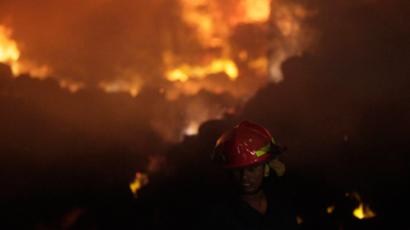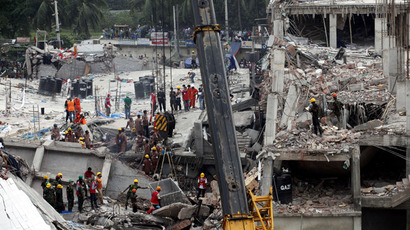Clashes as thousands of Cambodians protest Nike factory work conditions

Hundreds of police intervened after around 4,000 striking staff at Nike’s factory in the Cambodian capital clashed with colleagues, who continued working. This comes after the factory’s management refused to raise monthly salaries by US$12.
Police said that at least 11 officers and eight workers were injured during the brawl in Phnom Penh. The strikers also say seven people were arrested.
The employees at the Sabrina factory are pressing for a wage increase, following the death of 1,000 people in a collapse of a garment factory building in Bangladesh this April.
According to witnesses, the striking workers, who were armed with sticks and rocks, smashed windows before being confronted by the members of the opposing labor union, who didn’t support the action.
A contingent of about 1,000 police and soldiers, with batons and shields, was required to separate the clashing sides and disperse the strikers.
"We had to break them up in order to protect the whole factory from destruction," Kheng Tito, national military police spokesman, told Reuters.

The president of the Free Trade Union (FTU) at Sabrina, Sao Sreytouch, has accused the police and factory owners of colluding "to cause chaos" and force an end to the strike, running since May 21.
He said that the striking workers, who want their salary to be raised from the equivalent of $74 dollars to $88 per month, were the only ones beaten up and detained during the brawl.
Last week, the administration of the Taiwanese-owned Sabrina factory announced that it doesn’t have the necessary funds to increase their workers’ payment by the requested $12.
US sportswear giant, Nike, is monitoring the situation at one of its five plants in Cambodia, but the company’s stance on the issue is that the pay raise is the responsibility of the Sabrina factory alone.
"It is our understanding that this factory raised its own minimum wage on May 1 and pays above the country's minimum wage," Mary Remuzzi, Nike spokeswoman, told Reuters by e-mail.
The garment industry is Cambodia's biggest export earner, employing about 500,000 people in more than 500 garment and shoe factories. Last year, the Southeast Asian state shipped more $4 billion worth of products to the US and Europe.
New Bangladesh?
The protest action by the Cambodian workers is unlikely to have any effect as the issue of poor Indochinese states being exploited by Western brands must be solved on an international level, economist Richard Wolff, author of 'Democracy at work: A cure for capitalism', told RT.
“We know why the clothing giants are in places like Cambodia, Bangladesh and so on. They’re running away from the high wages that workers have successfully won in Europe, in North America and Japan and so on,” he said. “They’re running away to make more profits by paying lower wages.”
“The problem is – nothing has ever changed in that story unless and until the workers push back. And usually when they push back and make demands, the government is in the pockets of the businesses and so the lines are drawn. And we’re simply seeing in Cambodia the same sad replay. And here’s the worst of it. If the Cambodians are successful in pushing for higher wages – the way, for example, the Chinese have been in recent decades – well, then you’re going to get what? The movement of those firms out of Cambodia, making them pay for their demand for a decent life by losing their jobs. And going to yet another country that will prostrate itself in order get those jobs.”
Despite Nike
expressing its concern over the Cambodian strike, Wolff believes
the US company won’t move a finger to improve the conditions for
its workers in the Third World.

Reports of accidents and riots in such countries like Cambodia and Bangladesh are “always responded to by shock and surprise on the part of the employer – that no one in the US believes – and then a promise to investigate, which no one in the US takes seriously and which almost inevitably has little or no consequence as we can see by the endless repetition of these sorts of incidents,” he stressed.
Wolff also said that he’s concerned that Cambodia is becoming the new Bangladesh and he expects more strikes and riots from the local low-paid workers.
“We have to understand that countries like Cambodia are in a terrible situation. They’re trying desperately to recover from poverty, from uneven development, from the horrible wars the US waged in the Indochina,” he said.
“And they’re desperate for work to come and so they make themselves an available, an attractive place for capitalists to invest in – unbelievably low wages, no enforcement of all kinds of rules. The conditions, which saw the collapse of that building in Bangladesh, are reproduced in Cambodia. And it’s only than a matter of time before the horrific conditions produce a fight back on the part of the workers, who demand something of a participation, you might say, in the economic development that would be impossible without their low wages. And that puts them on a collision course with the employers, who try to get the local government to side with them.”















